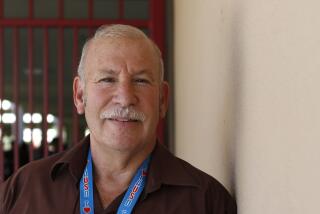LAUSD’s big test
Now that a judge has ruled that teachers’ performance evaluations in the Los Angeles Unified School District are inadequate and violate state law, the teachers union will finally have to work with district leaders on devising a reasonable method for using student achievement to measure teachers’ work. It would be a mistake for United Teachers Los Angeles to drag its heels on this; Superior Court Judge James C. Chalfant made it clear that he wants the two sides to make at least some progress by midsummer.
Chalfant wisely refrained from being prescriptive about how the schools go about this new era of measurement. There’s room for the district and the teachers union to fashion a thoughtful compromise that recognizes the utility of data but does not overly rely on it.
Supt. John Deasy has repeatedly said that he wants to use the state’s annual standards tests in teacher evaluations by measuring the growth in students’ scores year to year. But he and others who are intent on using them must keep in mind the tests’ limited value. Education experts have warned that they’re useful for ferreting out the 10% of teachers who are most effective at raising achievement and the bottom 10% who are failing their students. They’re much less effective at comparing the vast majority of teachers in the middle. That still makes them a worthwhile tool. It would be helpful to know the secrets of excellent teachers, while it’s imperative that perennially ineffective teachers are trained to improve or, if that doesn’t work, dismissed.
And that word “perennial” is important as well. A single year tells the district very little. Evaluations should be based on at least a few years’ scores.The district also must find a fair way of evaluating teachers whose students don’t take the annual tests and should look at multiple ways of measuring achievement, including student portfolios and graduation rates.
Finally, it would be unfair to judge teachers by test results when their students have no stake in the outcome. Some students, especially in middle and high school, put no effort into the annual tests because the scores aren’t counted in their grades. The district should include them as part of a student’s overall grade in any subject.
We have seen the Obama administration’s infatuation with test scores lead to their overuse and abuse in evaluating teachers in other states. Some make the results count for half of a teacher’s rating; that’s too much. California has refused to make any changes in the evaluation process, even though almost all teachers are routinely and unrealistically rated as doing just fine. Both L.A. Unified and the teachers union have a chance to show the state that it has nothing to fear from a fair yet meaningful evaluation that includes the use of data.
More to Read
A cure for the common opinion
Get thought-provoking perspectives with our weekly newsletter.
You may occasionally receive promotional content from the Los Angeles Times.






